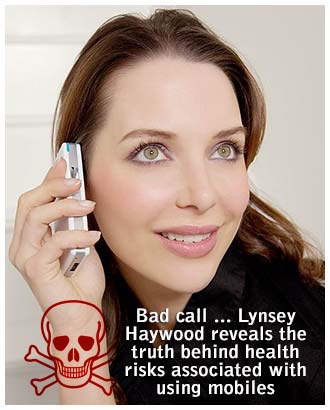Is your mobile cell phone killing you? Why using your phone could make you ill
IT’S good to talk – or is it?
- By Lynsey Haywood - May 03, 2012 - The SUN
 Scientists have called for urgent research into links between mobile phones and cancer after it was revealed there has been a 50 per cent increase in brain tumours since 1999.
Scientists have called for urgent research into links between mobile phones and cancer after it was revealed there has been a 50 per cent increase in brain tumours since 1999.
At the Children With Cancer conference in London, Professor Denis Henshaw, of Bristol University, said: “Vast numbers of people are using mobiles and they could be a health timebomb, not just for brain tumours but also infertility.
"We should be openly discussing the evidence but it is not happening.”
The World Health Organisation advise pragmatic ways to reduce exposure to radiation such as using hands-free kits and texting instead of making calls.
Here, Sun Health’s LYNSEY HAYWOOD looks at the health fears about mobile phones, the research and the experts’ views.
'Children using mobiles risk memory loss and sleeping disorders'
STUDY: Dr Gerard Hyland, biophysicist at the University of Warwick, has been using a device similar to an ECG machine which uses a colour printout to depict changes in the brain’s electric make-up.
FINDINGS: Children are at risk because their skulls are thinner, so radiation can penetrate. Dr Hyland said kids’ immune systems are less robust and still developing. He added that the risk was not “brain heating” but low-intensity or non-thermal radiation.
PROBLEM: No case studies have been examined and effects on children have not been checked.
EXPERT VIEW: Dr Hyland said: “Radiation is known to affect brain rhythms and children are particularly vulnerable. The main effects are neurological. If phones were a food, they would not be licensed.”
'Increased risk of infertility in men'
STUDY: US researchers in Cleveland and New Orleans looked at 361 men undergoing checks at a fertility clinic. They were divided into four groups, with 40 never using a mobile, 107 using them for less than two hours a day, 100 using them for two to four hours daily and 114 making calls for four hours or more.
FINDINGS: Those who used a mobile for more than four hours a day had a 25 per cent lower sperm count than men who never used a mobile. Those with the highest usage also had poorer sperm quality. The swimming ability of sperm – a crucial factor in conception – was down by a third.
PROBLEM: All men had sought treatment at a fertility clinic so they may not have been representative of the rest of society. No control group used.
EXPERT VIEW: Prof Ashok Agarwal, of the Reproductive Research Centre in Cleveland, Ohio, said: “Mobiles could be having a devastating effect on fertility. It still has to be proved but it could have a huge impact.”
'Use a mobile for more than ten years and you will get brain cancer'
STUDY: In 2007, scientists in Sweden collated 11 studies of tumour rates in people who had used phones for more than a decade, drawing on research in Sweden, Denmark, Finland, Japan, Germany, US and Britain.
FINDINGS: They found almost all users had an increased risk of a tumour on the side of the head. Long users were twice as likely to get the malignant gliomas, and two and a half times more likely to get benign tumours.
They said using the phone for just an hour a day was enough to increase risk.
PROBLEM: The study said risks did not differ between different cordless phones.
EXPERT VIEW: Professor Kjell Hansson Mild said: “I find it odd to see official presentations saying there is no risk. There are strong indications that something happens after ten years.”
'Using a mobile phone can trigger Alzheimer's disease'
 STUDY: Researchers at Sweden’s Lund University found mobile phones damage key brain cells and could trigger early Alzheimer’s. Rats were exposed to two hours of radiation equivalent to that emitted by a mobile phone.
STUDY: Researchers at Sweden’s Lund University found mobile phones damage key brain cells and could trigger early Alzheimer’s. Rats were exposed to two hours of radiation equivalent to that emitted by a mobile phone.
FINDINGS: The rats exposed to medium and high radiation levels had many dead brain cells, so scientists claimed waves from mobiles could damage areas of the brain associated with learning, memory and movement.
PROBLEM: The study used rats so it is hypothetical; there is no evidence a human’s brain is similarly affected.
EXPERT VIEW: Professor Leif Salford said: “A rat’s brain is very much the same as a human’s. We have good reason to believe that what happens in rats’ brains also happens in humans.”
'Children under eight are at higher risk of ear and brain tumours'
STUDY: A report by Sir William Stewart, of the National Radiological Protection Board, said there was cause for concern after four studies found evidence of potentially harmful effects.
FINDINGS: A ten-year Swedish study said heavy mobile phone users were prone to tumours in the ear and brain and a Dutch study suggested changes in cognitive function. A German study found an increase in cancer near mobile base stations and an EU project found evidence of cell damage.
PROBLEM: Studies were done in 2005. Many since found no evidence of mobiles causing tumours.
EXPERT VIEW: Sir William said: “These studies have yet to be replicated and are of varying quality but we can’t dismiss them out of hand.”


